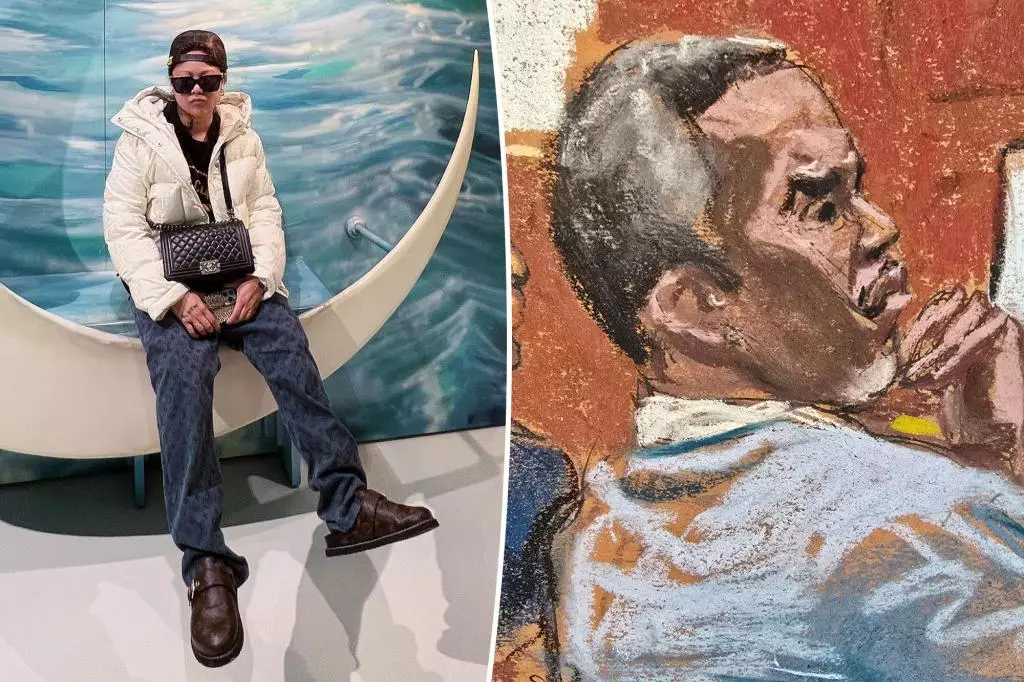In a courtroom drama that has captivated the public’s attention, fashion designer Bryana “Bana” Bongolan took the stand to recount a horrifying incident involving hip-hop mogul Sean “Diddy” Combs. The chilling details of her testimony revealed an alarming glimpse into what she describes as a traumatic and abusive encounter. Bongolan recounted how, in September 2016, Combs allegedly lifted her off the balcony of his ex-girlfriend Cassie Ventura’s high-rise condo in a fit of rage, leaving her to hang precariously over the edge. At a petite 5-foot-1 and weighing only about 110 pounds, the physical dominance was striking, serving as a vivid illustration of power dynamics at play in high-pressure situations.
Bongolan’s experiences are tragically inflected with a sense of disbelief that many can relate to—the horror of witnessing someone you once thought you knew turn into a figure of intimidation. “He basically came up from behind me,” she testified, emphasizing the suddenness with which she found herself in danger. It was a chilling moment underscored by Combs’ aggressive assertion: “You know what the f–k you did.” This assertion, coupled with Bongolan’s physical peril, creates a narrative that is both personal and profoundly systemic, reminiscent of many stories in which the victim is left to grapple with the unforeseen consequences of another person’s volatile rage.
Enduring the Aftermath of Trauma
The emotional repercussions of Bongolan’s experience continue to haunt her daily life. She testified that she suffers from “night terrors” and “paranoia,” vivid reminders of a traumatic past that plunges her into a distressing reality. Such mental health struggles underscore a critical aspect often overlooked in discussions of abuse: the lasting impact of trauma extends far beyond the initial physical confrontation. For Bongolan, the courtroom is not merely a venue for litigation but a battlefield for reclaiming not just her narrative, but her sense of safety and agency.
In the complex landscape of celebrity culture, Bongolan’s revelations shake the facade of glamor and success, exposing a grimmer truth beneath. The trauma she experienced is not an isolated incident; rather, it speaks to broader cultural issues regarding accountability in the entertainment industry, particularly concerning the treatment of women and the culture of silence that often surrounds such incidents.
A Pattern of Allegations
Bongolan’s account is mirrored by a series of witness testimonies that paint a troubling portrait of Combs’ alleged behavior. Cassie Ventura herself provided insight into a relationship marred by physical abuse, detailing harrowing encounters that reveal a pattern of violence and intimidation. The revelations from Bongolan and Ventura are echoed by Capricorn Clark, an ex-assistant to Combs, who testified to experiencing threats of violence for merely being associated with an adversary of Combs. These testimonies collectively suggest a troubling prevalence of aggression and a culture of fear within Combs’ sphere.
As the civil suit unfolds, it is essential to confront not just individual stories but the systemic issues that allow such behaviors to persist. How many voices have gone unheard due to fear of retribution? How many victims remain silenced, cautious of the fallout that may ensue in response to unveiling uncomfortable truths? Bongolan’s decision to file her lawsuit seeking $10 million in damages is not merely a financial pursuit; it symbolizes an effort to puncture the cloud of impunity that often cloaks powerful figures in the entertainment industry.
The Quest for Justice and Accountability
In suing Combs for sexual battery and false imprisonment, Bongolan underscores a vital movement towards justice that transcends her own experience. By bringing her story into the public domain, she not only seeks reparations for her personal trauma but also embarks on a larger quest—one that challenges the status quo of accountability. Just as Combs’ legal team confidently asserts that these claims will ultimately be proven “baseless,” Bongolan’s resolve reflects a growing acknowledgment among survivors of abuse: this is not merely a legal battle, but a fight for dignity, truth, and change.
As the examination of systematic abuse continues through courtroom proceedings, the outcome may very well hinge on society’s willingness to confront uncomfortable truths. Such a confrontation is long overdue and can shine a light on a culture that, for too long, has enabled the powerful to escape the dire consequences of their actions.
